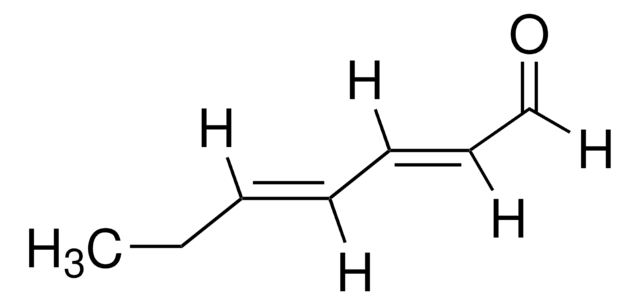W351504
1-Octen-3-one
50 wt. % in 1-octen-3-ol, stabilized, FG
Synonym(s):
N-pentyl vinyl ketone, Vinyl amyl ketone
About This Item
Recommended Products
biological source
synthetic
Quality Level
grade
FG
Halal
Kosher
reg. compliance
EU Regulation 1334/2008 & 178/2002
may contain
~0.10% α-Tocopherol as stabilizer
concentration
50 wt. % in 1-octen-3-ol
refractive index
n20/D 1.4359
bp
174-182 °C
density
0.843 g/mL at 25 °C
application(s)
flavors and fragrances
Documentation
see Safety & Documentation for available documents
food allergen
no known allergens
Organoleptic
mushroom; herbaceous; earthy
InChI
1S/C8H14O/c1-3-5-6-7-8(9)4-2/h4H,2-3,5-7H2,1H3
InChI key
KLTVSWGXIAYTHO-UHFFFAOYSA-N
Related Categories
General description
Packaging
Signal Word
Warning
Hazard Statements
Precautionary Statements
Hazard Classifications
Acute Tox. 4 Oral - Skin Irrit. 2 - Skin Sens. 1
Storage Class Code
10 - Combustible liquids
WGK
WGK 3
Flash Point(F)
145.0 °F - closed cup
Flash Point(C)
62.78 °C - closed cup
Personal Protective Equipment
Certificates of Analysis (COA)
Search for Certificates of Analysis (COA) by entering the products Lot/Batch Number. Lot and Batch Numbers can be found on a product’s label following the words ‘Lot’ or ‘Batch’.
Already Own This Product?
Find documentation for the products that you have recently purchased in the Document Library.
Customers Also Viewed
Our team of scientists has experience in all areas of research including Life Science, Material Science, Chemical Synthesis, Chromatography, Analytical and many others.
Contact Technical Service















